Desiring & Seeking Wisdom
In Isaiah 5:8-12, 18-24, we read:
Woe to those who join house to house, who add field to field, until there is no more room, and you are made to dwell alone in the midst of the land. The Lord of hosts has sworn in my hearing: “Surely many houses shall be desolate, large and beautiful houses, without inhabitant. For ten acres of vineyard shall yield but one bath, and a homer of seed shall yield but an ephah.”
Woe to those who rise early in the morning, that they may run after strong drink, who tarry late into the evening as wine inflames them! They have lyre and harp, tambourine and flute and wine at their feasts, but they do not regard the deeds of the Lord, or see the work of his hands.
Woe to those who draw iniquity with cords of falsehood, who draw sin as with cart ropes, who say: “Let him be quick, let him speed his work that we may see it; let the counsel of the Holy One of Israel draw near, and let it come, that we may know it!”
Woe to those who call evil good and good evil, who put darkness for light and light for darkness, who put bitter for sweet and sweet for bitter! Woe to those who are wise in their own eyes, and shrewd in their own sight! Woe to those who are heroes at drinking wine, and valiant men in mixing strong drink, who acquit the guilty for a bribe, and deprive the innocent of his right!
Therefore, as the tongue of fire devours the stubble, and as dry grass sinks down in the flame, so their root will be as rottenness, and their blossom go up like dust; for they have rejected the law of the Lord of hosts, and have despised the word of the Holy One of Israel.
As I reading this, I was struck in particular by this, “Woe to those who are wise in their own sight and shrewd in their own mind.” It speaks to both wisdom and arrogance. As I follow national and international events, I've noticed that people have plenty of arrogance but precious little wisdom. In fact, I see leaders showing so little wisdom, they do things that seem crazy. Perhaps, you have read the news, heard about a decision that a national leader, or Congress has made and said to yourself, “that’s crazy! What were they thinking?”
So let's focus on what wisdom is, and — just as importantly — what it is not. It’s critical to understand the meaning of true wisdom, or we are very likely to fall into the trap that Isaiah warns us about: being wise in our own sight.
Understanding Wisdom vs. Knowledge
It’s easy to become confused about the difference between wisdom and knowledge. Sometimes we use the words interchangeably, and that’s an error on our part. Knowledge is information we accumulate, while wisdom is the correct interpretation and utilization of that information.
We can be very knowledgeable about something and not very wise in how we deal with it. Knowledge without wisdom can lead us to draw faulty conclusions, which in turn can lead us to some pretty horrific decisions.
An example of the difference between knowledge and wisdom is the idea of spontaneous generation. Spontaneous generation was a scientific theory, propounded by the great thinker Aristotle, who claimed that living matter could come from nonliving matter and did so as a regular occurrence.
We now know that is not the case, but let’s look back at how Aristotle came to believe such a thing. He observed that fleas could be found in dusty, dirty places. He saw that maggots could be found in dead carcasses. Oysters would
grow in slimy places. Since he had not observed a birth process in these creatures like those found in other animals like horses or dogs or cats, he thought that somehow the places they were found formed them. Dust made fleas, rotting meat made maggots, and so on. Lots of observational information gave him some knowledge of the process, but he didn’t have the wisdom to draw a good conclusion. Before the microscope, it was difficult to observe very small things like the eggs of fleas or flies, so we might forgive Aristotle for believing that he had all the facts. That mistaken belief, coupled with the belief that he could come up with the answer to this mystery all on his own, led him to draw a bad conclusion. Aristotle did not understand the fundamental principal that death cannot breed life.
He lacked wisdom.
Many people do the same thing with God. We see someone dying of cancer, and we believe (or at least hope) that God can heal them. When that person dies despite our best efforts and lots of prayers, we might conclude one of two things: either that God is not as powerful as we thought He was and couldn’t save them, or that He is as powerful as we thought and didn’t care enough to save them. Both conclusions are based on two erroneous assumptions: that we have all the facts necessary to form a good conclusion and that we can fathom the mind of God.
Much as we hate to admit it, we can’t see everything that God sees. We don’t know everything that He knows. Since God is omniscient, He has all the data points that He needs to make a good decision, and we in our arrogance are brazen enough to second guess Him.
We put our own limited understanding above the mind of God.
Not a bright move on our part, to say the least, but we do it every day, don’t we?
King Solomon was considered the wisest ruler Israel ever had. What did he have to say about gaining wisdom? Solomon wrote in the book of Proverbs (9:10), “The fear of the Lord is the beginning of wisdom.” So, if we’re looking for answers, fear of the Lord is the place to start. What does that mean, exactly? Does it mean that we respond to God the same way we do to the monster in a horror flick, with terror and trembling? Of course not! It means that we approach God with respect, reverence, and awe because of who He is. The proper fear, the knowledge of His supreme power coupled with deep respect can maximize God’s impact in our lives and speed our spiritual growth. Unfortunately, we almost always think of fear as something bad. To the modern mind, “Fear of the Lord”, can make God sound like some kind of bully.
I can draw an earthly example of the right kind of fear with my initial experience in the Marine Corps. During my ten weeks of Officer Candidate School, I had an intimate, intense daily encounter with the classic Marine Corps Drill Instructor, known in popular culture as the DI.
The Marine Corps carefully selects and trains these men and women to instill a sense of fear in to bootcamp recruits and officer “cand-i-dates”. My DIs powerfully projected knowledge, wisdom, and fear. They exerted control over every minute of our lives. They taught rules and sought to instantly punish wrong decisions and actions on our part in violations of those rules.
They were LAW and occasionally grace. What I saw from the first day, was that they wanted us to realize our full potential as Marine Officers who would someday make life or death decisions. They wanted us to learn wisdom and they used fear to move us in the right direction. Trusting that they wanted the best for us, I had more and more respect and even love for my DIs. The thoughts of punishment faded away and so did my fear.
So it is with the fear of God. If we approach God with the proper attitude, then our love for God rather than fear will grow and we are in a good position to begin a dialog with Him. We are in a great position to receive from Him. That’s good news if we want to gain wisdom. As the Apostle John wrote and we read in John 4:18, “Perfect love casts out fear.”
Looking to the Author of Wisdom
God is the “author of wisdom,” so He’s our source for that great gift — and it is a gift. In Proverbs 2:6, Solomon tells us, "For the LORD gives wisdom; from his mouth come knowledge and understanding."
James agrees with Solomon in James 1:5 when he says, “If any of you lacks wisdom, you should ask God, who gives
generously to all without finding fault, and it will be given to you.”
In our current culture of self-sufficiency, it’s hard to acknowledge that we can’t figure everything out on our own, thank you very much, but the Bible says that we are foolish to try.
Proverbs 3:5–6 also says, “Trust in the Lord with all your heart, and do not lean on your own understanding. In all your ways acknowledge him, and he will make straight your paths.”
Great passage, great promise... but hard to do when we’re faced with difficult decisions. In the end, real wisdom comes
not from us, but from God, and we must trust Him to guide us. I admit, that’s a tall order when the stakes are high. It’s easy to trust Him with the smaller decisions in life, where the consequences for a bad decision are small. It’s in the big decisions that we falter: whether we stay in a job that makes us operate in the “gray,” doing things of questionable morality, whether we stay in an area or go to help our aging parents, if we allow our kids to stay in schools that teach things to which we are morally opposed — all those situations have high price tags attached to them.
Sadly, those times when God’s guidance would be most helpful are also those that we are least likely to consult Him. Even when we do consult Him, and we get an answer, particularly if it’s one we don’t like, we waver. We tell ourselves, that couldn’t be what God wants. It doesn’t make sense. Or, the cost is too high.
We lean on our own understanding.
What would have happened to the world if Noah had leaned on his own understanding? Building a huge boat in the middle of dry land didn’t make a lot of sense while he was building it. His wife certainly didn’t think it was a wise decision on his part. Thankfully, Noah listened to God rather that the people around him and mankind was saved through his wise actions.
So how do we get wisdom? We do what King Solomon did. We ask God for it. We listen for God’s direction before we march out in our own strength. We operate in humility and don’t assume that we always have the best answer. We ask the opinion of others whom we have seen to be wise. If we do those things, even if we get it wrong some of the time, we will grow in wisdom. Sometimes mistakes teach us more than getting it right.
We even have an advantage over Solomon, perhaps the wisest man who ever lived. Solomon, eventually let his pride and lusts lead him away from God’s wisdom. Solomon forgot the fear of the Lord. Once Solomon had started down the path of breaking God’s law by introducing idols to Israel through the worship of his foreign wives, it was harder and harder for him to repent. We however have the Grace of God and the Holy Spirit within us who will continually call to us and, when asked, teach us wisdom.
So, let us call upon God, the Holy Spirit, in the name of Jesus to move in our hearts.
I encourage you to take a little time to ask God to give you, through the Holy Spirit, wisdom to make good, godly decisions.
He won’t disappoint you. He is faithful. He is wise. He will answer.




